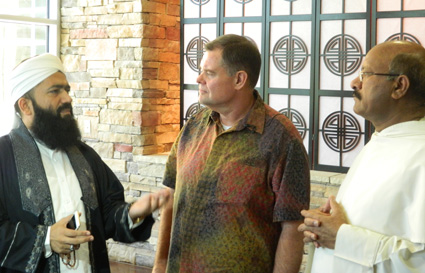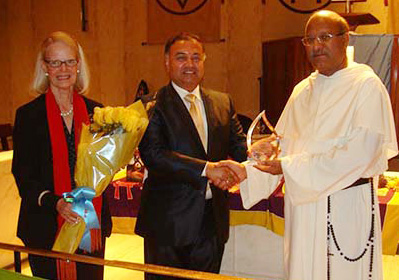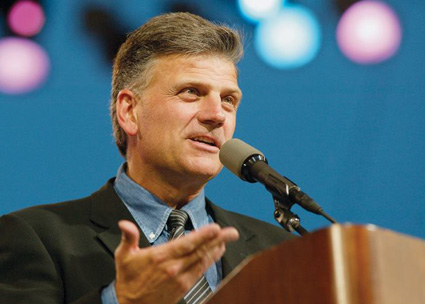Defending religious minorities helps majority, faith leaders agree
KELLER—When Muslims defend Christians in Pakistan and Christians speak up for Muslims in the United States, they not only follow the highest ideals of their religions, but also act in their own enlightened self-interest, a Baptist pastor in North Texas and a Catholic priest and a Muslim imam from Pakistan agreed.
 Bob Roberts (center) talks with Pakistani religious leaders Abdul-Khabir Azad (left) and James Channan (right). Roberts helped facilitate a meeting of 10 Pakistani Christian leaders and 10 imams from Pakistan at the Doha Interfaith Center in Qatar in June. (PHOTO / Ken Camp)“We’re trying to watch one another’s backs,” Pastor Bob Roberts of Northwood Church in Keller said.
Bob Roberts (center) talks with Pakistani religious leaders Abdul-Khabir Azad (left) and James Channan (right). Roberts helped facilitate a meeting of 10 Pakistani Christian leaders and 10 imams from Pakistan at the Doha Interfaith Center in Qatar in June. (PHOTO / Ken Camp)“We’re trying to watch one another’s backs,” Pastor Bob Roberts of Northwood Church in Keller said.
“How we treat Muslims here (in the United States) has an impact on Christians in Pakistan and Egypt and other places around the world. We need to learn how to be civil. We need to teach those who are in the majority how to treat those who are in the minority. We want to pull together pastors and imams in different areas. We need to watch out for religious minorities worldwide.”
Abdul-Khabir Azad, the grand imam of the 350-year-old Badshahi Mosque in Lahore, Pakistan, and James Channan, regional coordinator of the United Religions Initiative-Pakistan, agreed.
In June, Roberts helped facilitate a meeting of 10 Pakistani Christian leaders and 10 imams from Pakistan at the Doha Interfaith Center in Qatar. Now, Azad and Channan want to use that model in their homeland, fostering dialogue and nurturing relationships between religious leaders at the grassroots level.
“We want to heal wounds and build bridges,” said Channan, a Roman Catholic priest and director of the Peace Center of the Dominican Order in Pakistan. The author of Path of Love: A Call for Interfaith Harmony, he recently received the Global Ambassador of Peace Award from the Institute of International Social Development at the United Nations.
 James Channan (right) receives the Global Ambassador of Peace Award from the Institute of International Social Development at the United Nations, July 16. (United Religions Initiative Photo)Christianity’s roots run deep in Pakistan, he said.
James Channan (right) receives the Global Ambassador of Peace Award from the Institute of International Social Development at the United Nations, July 16. (United Religions Initiative Photo)Christianity’s roots run deep in Pakistan, he said.
“It is good to be a Christian in Pakistan. We trace our beginning to St. Thomas the Apostle. So, our roots go back to the first century,” Channon said.
However, Christians in his homeland suffer discrimination—“and some persecution”—at the hands of what he described as “a small number of Muslims.”
Channan points to Azad as an ally who has helped defuse volatile situations and advocate for the rights of Christians. For instance, when some Muslim clerics spread word a Christian had desecrated the Quran, mob violence erupted and rioters burned the homes of 170 Christian families in Lahore.
“The grand imam came and consoled those Christian families, and he demanded before the government that their houses be rebuilt,” Channan said.
Violence and hatred ‘bring reproach’
Azad—whose mosque is the second largest in South Asia and fifth largest in the world—insisted any person who advocates violence and hatred brings reproach on whatever religion he espouses.
“Misguided people should be stopped,” he said, adding he is “embarrassed” when people claiming to represent Islam foment violence, and true Islam is “set back” by their actions.
Azad acknowledged some mainstream Muslims have been slow to denounce others who commit violence in the name of Islam, but he believes that is changing—and must change.
“These people are defaming Islam,” he said. “They are going against Islamic teaching. They do not represent any religion.”
Bringing together Christian and Muslim religious leaders in Pakistan holds the potential for lasting change, Channan insisted.
“We want to live in peace in Pakistan,” he said. “We want to have full freedom of expression for religion. We believe the religion of every person should be respected. … It is a fundamental human right.”
Involvement in missions led Roberts—a second-generation Texas Baptist minister—to encourage interfaith dialogue.
He led his church to begin work in Vietnam in the mid-1990s, demonstrating God’s love by providing medical care and educational opportunities for orphans.
After demonstrating they could work with professed atheists in communist Vietnam, Northwood volunteers next began working with imams to facilitate similar projects in Afghanistan. They also worked with Palestinian Christians in the Middle East.
Promoting understanding
So, after the 9/11 attacks on the World Trade Center and Pentagon, Roberts tried to foster interfaith dialogue in the Dallas-Fort Worth area—not to minimize theological differences, but to promote understanding, he noted.
 Evangelist Franklin Graham recently called for a ban on all immigration of Muslims to the United States. (Franklin Graham Facebook Photo)“We live in a pluralistic world, and we have to learn how to build bridges among people of different religions without compromising our distinctive beliefs,” Roberts said.
Evangelist Franklin Graham recently called for a ban on all immigration of Muslims to the United States. (Franklin Graham Facebook Photo)“We live in a pluralistic world, and we have to learn how to build bridges among people of different religions without compromising our distinctive beliefs,” Roberts said.
Recently, when evangelist Franklin Graham used his Facebook page page to call for a ban on all immigration of Muslims to the United States after shootings in Chattanooga left four Marines and a Navy sailor dead, Roberts denounced Graham’s remarks.
“I wasn’t trying to trash Franklin Graham,” Roberts explained. “But when Billy Graham’s son says something like that, it has an impact on Christian work in Muslim countries.”
Roberts considers defense of religious liberty for all as “Baptists’ greatest gift to the world,” and he sees a clear link between unfettered religious freedom and the spread of the gospel. When Christians befriend people of other religions and defend their right to practice their faith, Christians earn the right to be heard.
“Let the gospel flourish in a global context in the public square,” he said.